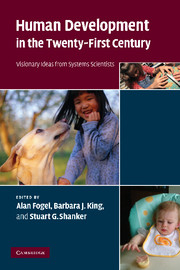Book contents
- Frontmatter
- Contents
- List of contributors
- Introduction: Why a dynamic systems approach to fostering human development?
- Part I Dynamic relationships between genetics and environments
- Part II The dynamic system of the child in the family
- Part III The dynamic system of the child in social and physical environment
- 10 The tempest: anthropology and human development
- 11 An anthropology of human development: what difference does it make?
- 12 The social child
- 13 Learning about human development from a study of educational failure
- 14 Dynamic views of education
- 15 Embodied communication in non-human animals
- 16 Children in the living world: why animals matter for children's development
- Part IV Dynamic systems approaches to mental health
- Part V Conclusions and outlook
- Index
- References
16 - Children in the living world: why animals matter for children's development
Published online by Cambridge University Press: 22 September 2009
- Frontmatter
- Contents
- List of contributors
- Introduction: Why a dynamic systems approach to fostering human development?
- Part I Dynamic relationships between genetics and environments
- Part II The dynamic system of the child in the family
- Part III The dynamic system of the child in social and physical environment
- 10 The tempest: anthropology and human development
- 11 An anthropology of human development: what difference does it make?
- 12 The social child
- 13 Learning about human development from a study of educational failure
- 14 Dynamic views of education
- 15 Embodied communication in non-human animals
- 16 Children in the living world: why animals matter for children's development
- Part IV Dynamic systems approaches to mental health
- Part V Conclusions and outlook
- Index
- References
Summary
On a fine spring day, a happy blur of waving arms and jumping feet greets me as I arrive to observe outdoor playtime at the preschool. A half dozen three and four-year-olds are playing “chase” with Lucy. The children become more excited, shrieking and whooping, as Lucy whizzes with whirlwind speed around them. At this point, the teacher, Meridyth, intervenes, reminding the children how small Lucy is, and how they must be careful not to get too rough with her. An internal struggle between heightened arousal and “chilling out” seems to play across the children's faces. I see one little boy, who has skidded to a halt in mid-chase after Lucy, unconsciously clench and unclench his fists as he listens to the teacher's admonitions.
Blake, eight years old, is sprawled on the couch, lazing away another Saturday morning in front of the TV. When Scot appears, Blake slides over, patting the couch seat next to him with an encouraging, “Come here.” After a few moments on the couch, Scot jumps down, goes to the door, and casts a fixed look back at Blake, who keeps staring at the screen. Scot comes back to Blake, nudges him for attention, and as soon as he looks up, Scot bounds back to the door. He stands in front of it, seeming to stare right through the door to the snowy outside.
- Type
- Chapter
- Information
- Human Development in the Twenty-First CenturyVisionary Ideas from Systems Scientists, pp. 147 - 154Publisher: Cambridge University PressPrint publication year: 2007
References
- 3
- Cited by



